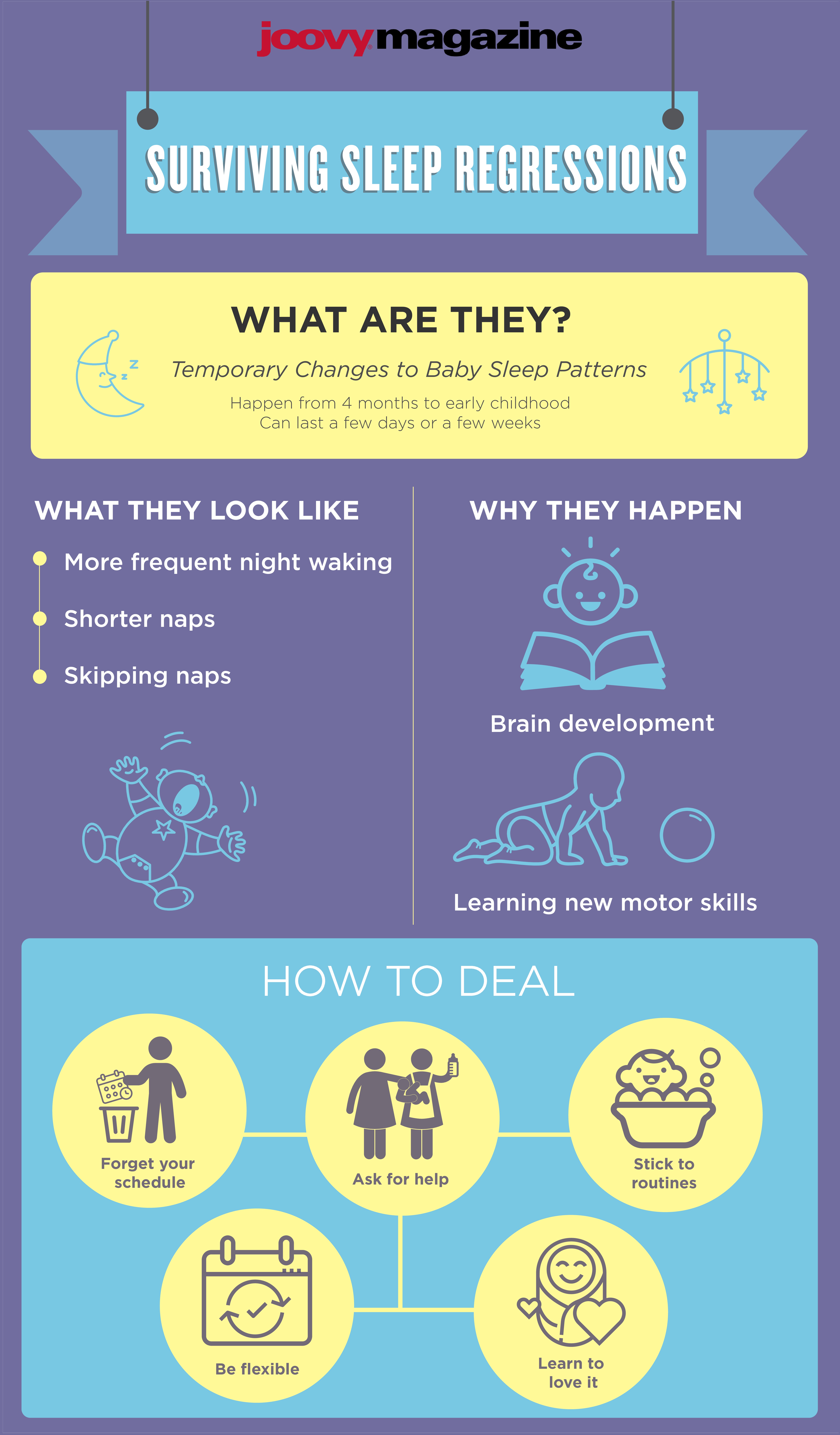
How to Survive Sleep Regressions
Parents are experts at sleep deprivation. When a tiny human’s survival is dependent on you, you learn some creative ways to cope with fragmented sleep pretty quickly.
But what about those periods of time that seem never-ending, when babies just WON’T sleep? When naps come and go, when your entire schedule gets turned upside down, just as you think you’re starting to nail it?
Sleep regressions are periods of time in which babies are doing some major growing, both physically and mentally. They’re learning new motor skills or developing new parts of their brain that have previously been pretty quiet.
These periods of time are SO exciting for babies, it often results in a disruption in the sleep routine you’ve worked so hard to establish. Babies will often skip naps and wake at odd hours for long stretches of playtime.
We chatted with certified child sleep consultant Joanna Martindale to get her tips on coping with sleep regressions.
Better yet: we learned how to thrive during them.
 Joanna has a lot of experience with babies who won’t sleep. In her work as a certified sleep consultant, she’s worked with parents and babies across a wide variety of scenarios, ranging from your typical newborn development sleep regressions to working with children struggling with behavioral issues to boot.
Joanna has a lot of experience with babies who won’t sleep. In her work as a certified sleep consultant, she’s worked with parents and babies across a wide variety of scenarios, ranging from your typical newborn development sleep regressions to working with children struggling with behavioral issues to boot.
She’s a board-certified behavior analyst, owner of Baby Sleep Concierge, and a mom who has been there, and so done that. We knew she’d be the woman to talk sleep regressions with.

Scientists have discovered that even physical pain can be overcome by mental perception, and the same holds true for other challenges. What we focus on, we amplify, but positive thinking can actually help us to cope with sleep regressions in a way that’s healthy, both for baby and parent.

Sleep regressions (or developmental progressions) typically happen at specific developmental milestones. Something changes, the baby’s brain gets stronger and mightier, and suddenly, sleep doesn’t sound like such a great idea.
While every baby is different, you can typically expect these regressions to hit around these times:
4 months
8 months
12 months
18 months
24 months
Use the Wonder Weeks app to give yourself a heads up if you’d like to see what’s happening and when, but keep in mind that this is just a guideline — babies don’t believe in rules (or calendars).

We get it — coping with a sleep regression, no matter how well-informed you are and no matter how positive you’re thinking, can be incredibly difficult.
You’re not alone, and you’ve got this. Joanna shared some of the tips she gives to her clients over at The Baby Sleep Concierge, and they’re golden.

When a sleep regression happens, many parents feel the need to dig their heels in deeper on their routines and schedules. Joanna says it’s not practical and can cause more stress than it relieves.
Clinging to a routine can also create a baby who’s overtired and resistant to sleep as a result. The lesson? Let them sleep when they’re tired, and just keep on keeping on — the clock is pretty irrelevant at this stage.

When you’re just doing what you need to do to survive, the last thing you want to hear is that your survival method is going to create a monster. There’s good news though:

Sleep regressions last as long as they last — sometimes a few days, sometimes a few weeks. Don’t overthink it, and don’t drive yourself crazy comparing your baby’s sleep habits to someone else’s. Everybody is different, and there is no hard and fast rule for what this is supposed to look like.
If the only way you can get your baby to sleep for longer than five minutes is to push him around in the stroller, then do what you have to do. It doesn’t have to be perfect because it definitely isn’t forever.

Parenting has become a lonely journey, but it’s not supposed to be. Generations before this one, parents were leaning on each other in ways not seen in modern parenting. Friends and family coming over to hold your baby during a shower was an almost daily occurrence. In-laws lived with you to help you raise your littles together, and you never spent days by yourself trying to make it all work.
All that to say, raising babies is hard, and it’s not just okay if you need help — it’s normal.

When you have a baby going through a sleep regression and one or more older siblings to boot, life starts to feel pretty impossible.
Joanna’s advice goes back to asking for help when you need it, along with getting creative to keep older littles occupied while you try to get baby down for naps.

It can feel neverending but remember: this is an AMAZING time for your baby. It’s a whole new world, and he’s seeing and experiencing it all for the first time. Drop schedules and expectations, and lean into making these moments count for you both.
It will feel challenging at times, but it can also be some of the most incredible moments you’ll share with your baby. Don’t let them blur into memories of frustration, let them bloom into moments of amazement.

But what about those periods of time that seem never-ending, when babies just WON’T sleep? When naps come and go, when your entire schedule gets turned upside down, just as you think you’re starting to nail it?
Sleep regressions are periods of time in which babies are doing some major growing, both physically and mentally. They’re learning new motor skills or developing new parts of their brain that have previously been pretty quiet.
These periods of time are SO exciting for babies, it often results in a disruption in the sleep routine you’ve worked so hard to establish. Babies will often skip naps and wake at odd hours for long stretches of playtime.
We chatted with certified child sleep consultant Joanna Martindale to get her tips on coping with sleep regressions.
Better yet: we learned how to thrive during them.
Changing the Way You See a Sleep Regression
 Joanna has a lot of experience with babies who won’t sleep. In her work as a certified sleep consultant, she’s worked with parents and babies across a wide variety of scenarios, ranging from your typical newborn development sleep regressions to working with children struggling with behavioral issues to boot.
Joanna has a lot of experience with babies who won’t sleep. In her work as a certified sleep consultant, she’s worked with parents and babies across a wide variety of scenarios, ranging from your typical newborn development sleep regressions to working with children struggling with behavioral issues to boot.
She’s a board-certified behavior analyst, owner of Baby Sleep Concierge, and a mom who has been there, and so done that. We knew she’d be the woman to talk sleep regressions with.
“I believe that words hold a lot of power. Calling something a "regression" implies that the baby has gone backward in some way, when the opposite is actually true.”Joanna says that instead of looking at sleep regressions as setbacks, we need to look at them as good things, developmental progressions that mean our babies are growing and developing at a healthy pace.

“I prefer to call these times developmental "progressions" instead, because really, that is what is happening during these phases. Let's give our babies some credit for all that hard work!”It’s tough to be optimistic when you’re rocking a baby to sleep at one in the morning, but Joanna makes a point that’s founded in how our brains are wired: how we perceive what happens has the power to shape how we handle these situations.
Scientists have discovered that even physical pain can be overcome by mental perception, and the same holds true for other challenges. What we focus on, we amplify, but positive thinking can actually help us to cope with sleep regressions in a way that’s healthy, both for baby and parent.
When You Can Typically Expect a Sleep Regression

Sleep regressions (or developmental progressions) typically happen at specific developmental milestones. Something changes, the baby’s brain gets stronger and mightier, and suddenly, sleep doesn’t sound like such a great idea.
“There is a lot of cognitive development happening at the four-month mark, for example,” says Joanna.“The baby is coming out of the 4th trimester and becoming more aware of his surroundings, sequencing events together, recognizing people and voices, and so much more. We see it again around eight months as the baby begins going through separation anxiety. We also see it when the baby is learning a new physical milestone, such as rolling, crawling, standing, walking, etc.”
While every baby is different, you can typically expect these regressions to hit around these times:
4 months
- End of the fourth trimester
- Able to sequence events
- Fully functional eyesight
- Recognizes people and voices
8 months
- Brain and motor skill development
- The beginnings of crawling, standing
- Separation anxiety typically starts
12 months
- Sleep changes, naps may decrease temporarily
18 months
- Separation anxiety flares up again
- Begins having opinions about sleep
- Teething
- Nap transitions
24 months
- Sometimes nightmares play a role
- Independence can create arguments around bedtime
- More napping transitions
Use the Wonder Weeks app to give yourself a heads up if you’d like to see what’s happening and when, but keep in mind that this is just a guideline — babies don’t believe in rules (or calendars).
So What Do I DO??!

We get it — coping with a sleep regression, no matter how well-informed you are and no matter how positive you’re thinking, can be incredibly difficult.
You’re not alone, and you’ve got this. Joanna shared some of the tips she gives to her clients over at The Baby Sleep Concierge, and they’re golden.
#1 — Stick to Rhythms Over Routines

When a sleep regression happens, many parents feel the need to dig their heels in deeper on their routines and schedules. Joanna says it’s not practical and can cause more stress than it relieves.
“I think "routine" and "schedule" put a lot of pressure on parents, so I coach parents into maintaining a rhythm to their day instead. The timing of naps will likely vary from day to day (depending on whether the nap was 30 minutes versus two hours), which is okay. Parents should stick to their rhythms and wind-down routines before naps and bedtime always. Having a predictable rhythm to their day will actually keep a baby more calm and centered.”
Clinging to a routine can also create a baby who’s overtired and resistant to sleep as a result. The lesson? Let them sleep when they’re tired, and just keep on keeping on — the clock is pretty irrelevant at this stage.
#2 — Know That Babies With Bad Habits Aren’t a Thing

When you’re just doing what you need to do to survive, the last thing you want to hear is that your survival method is going to create a monster. There’s good news though:
- You can officially stop listening to people trying to tell you you’re doing it all wrong.
- You can’t create a baby with bad habits.
“I think no bad habits can really be created for a baby because small babies do need to be parented to sleep,” says Joanna.Give baby all the cuddles, all the time — nobody ever suffered from being loved too much.
#3 — Trust Your Gut (And Stop Googling)

Sleep regressions last as long as they last — sometimes a few days, sometimes a few weeks. Don’t overthink it, and don’t drive yourself crazy comparing your baby’s sleep habits to someone else’s. Everybody is different, and there is no hard and fast rule for what this is supposed to look like.
If the only way you can get your baby to sleep for longer than five minutes is to push him around in the stroller, then do what you have to do. It doesn’t have to be perfect because it definitely isn’t forever.
“Sometimes babies need a little bit more support from us, which may translate into napping in a carrier, stroller, or a caregiver’s arms for a few days. The phase is just that — a phase. It will pass and life will get back to your "new normal."
#4 — Don’t Be Afraid to Ask for Help

Parenting has become a lonely journey, but it’s not supposed to be. Generations before this one, parents were leaning on each other in ways not seen in modern parenting. Friends and family coming over to hold your baby during a shower was an almost daily occurrence. In-laws lived with you to help you raise your littles together, and you never spent days by yourself trying to make it all work.
All that to say, raising babies is hard, and it’s not just okay if you need help — it’s normal.
“If a parent's sleep situation is feeling unbearable, then it is always a good idea to reach out to a few sleep consultants (or doulas, night nannies, etc.) to get some help on the sleep front.”
#5 — Get Creative When It Comes to Siblings

When you have a baby going through a sleep regression and one or more older siblings to boot, life starts to feel pretty impossible.
Joanna’s advice goes back to asking for help when you need it, along with getting creative to keep older littles occupied while you try to get baby down for naps.
“Don't worry about naps being independent in the crib, it's okay if they’re in the stroller while your older one is playing at the park.”
“I also love creating a "busy box" for older siblings while parents are nursing or putting baby down to sleep. The busy box can be full of items that either your child has never seen before, or it has been a while. They only get access to this box during these times when parents are tending to the new baby, so that it is always exciting. Change out the items you put in there every few days to keep them guessing."
You Can Do This

It can feel neverending but remember: this is an AMAZING time for your baby. It’s a whole new world, and he’s seeing and experiencing it all for the first time. Drop schedules and expectations, and lean into making these moments count for you both.
It will feel challenging at times, but it can also be some of the most incredible moments you’ll share with your baby. Don’t let them blur into memories of frustration, let them bloom into moments of amazement.



